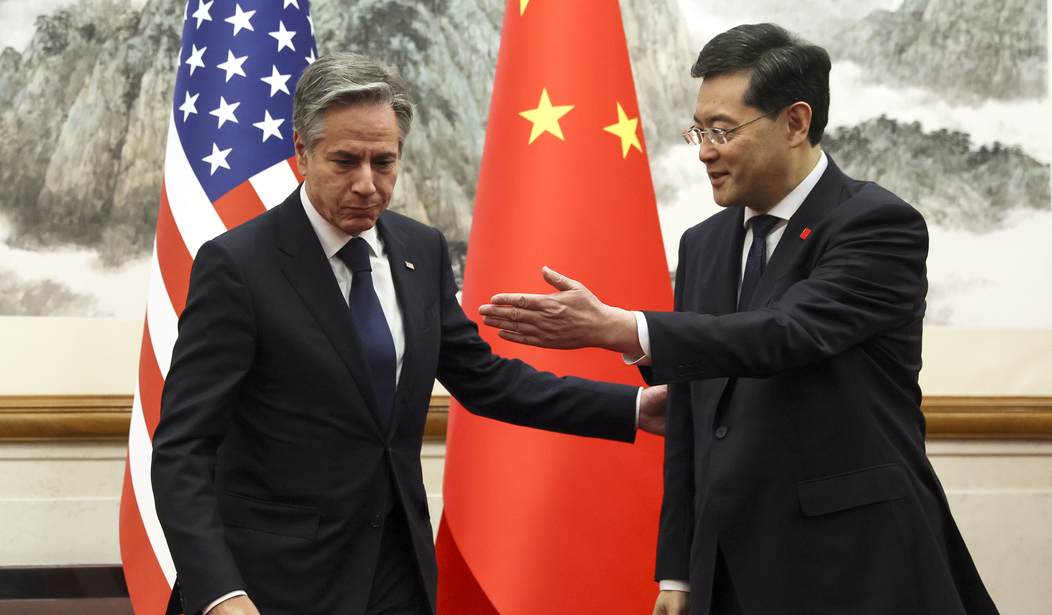Qin Gang, the Chinese Foreign Minister who disappeared from public view about a month ago, has been replaced by top Communist Party foreign policy honcho Wang Yi.
Wang held the foreign minister’s portfolio immediately prior to Qin, from 2013-22. Qin held the foreign minister’s job for only six months and was considered a close and trusted confidante of President Xi Jinping.
Even experts on China were perplexed by Qin’s rapid fall from favor. Richard McGregor, senior fellow at the Lowy Institute, points to the foreign minister swap as an example of Chinese government “opacity.”
“If people wanted displayed on a wide screen the opacity of the Chinese system, and how that can… hobble the execution of policy, then they’ve got a prime example of it here,” Richard McGregor, a senior fellow at the Lowy Institute.” https://t.co/TWiNvhX98E
— Michael Fullilove (@mfullilove) July 25, 2023
In a sign that Mr. Qin has been disappeared by the Communists, the foreign ministry has erased nearly all mentions of Qin’s name from its website. This is reminiscent of what happened in the old Soviet Union when an official fell out of favor or suffered some kind of “accident” — usually one and the same.
The fact that he was erased from official mention so quickly gives the lie to the government’s initial explanation of a “health incident” — he lost an important body part.
“Even if health issues had necessitated Qin’s removal as foreign minister, there is no reason this would lead to the deletion of the past record of his meetings within the MFA site,” wrote David Bandurski, director of the China Media Project, a U.S.-based research group.
Replacing Qin with Wang may be only a temporary solution. Wang is 69, while Qin is 57. It could be that President Xi will be looking for someone younger for the post. But why would Xi oust a close confidant and trusted ally?
Qin remains on the state council for now, which has only fuelled further speculation. Rumours have included a power struggle with Wang, a political blunder during or around a meeting with the US secretary of state, Antony Blinken, the week before Qin disappeared, or being compromised by foreign intelligence services.
There have been allegations of an affair with a TV anchor who has also not been seen in public since she posted a tweet including a photo of herself interviewing Qin on 11 April, but analysts say an affair would not normally trigger a political purging on its own.
Is it still possible that Qin’s been sidelined for health reasons?
“But there are indications that Qin is in a lot more trouble than that,” James Palmer, the Foreign Policy editor, wrote on Wednesday, noting the scrubbing of references to Qin from government websites. “The suddenness of Qin’s removal — even if normal in a political system like China’s — may indicate that he was swept into shuanggui, China’s extrajudicial interrogation system for CCP members who are deemed politically suspect.”
This suggests that Qin displeased Xi in a matter of politics, although the most common crime the extrajudicial court judges is corruption.
There are still rumors circulating about Qin’s romantic involvement with a Hong Kong TV news presenter, but most experts dismiss any punishment for a top Chinese official stepping out on his wife. There have been rumors that the news presenter, Fu Xiaotian, is a British agent, but that’s a little farfetched.
Whatever Qin did wrong — or is presumed to have done wrong — some analysts are saying that Xi’s failure with Qin is indicative of a failed system.
“China used to be very rigorous on personnel appointment, which includes reviewing candidates’ background and consultation with different stakeholders,” said Alfred Wu, an expert on Chinese politics at the National University of Singapore. Xi Jinping’s centralized decision-making process has “disabled” the checks and balances that used to exist in the Communist Party.
“China’s system is broken,” Wu said.
Independent Chinese expert Wu adds that Beijing hopes to minimize the impact of Qin’s removal by appointing a familiar figure like Wang to the role of foreign minister.
“Beijing wants to do some damage control to its interaction with other countries, and replacing Qin with Wang can avoid creating more uncertainty,” he explained.
Wang, who was China’s foreign minister between 2013 and 2022, is now both the Communist Party’s director of foreign affairs and China’s foreign minister, which some experts say could be counterproductive to China’s foreign policy implementation.
There could be rough waters ahead for Chinese relations with some countries. But China’s relationship with Russia and the U.S. probably won’t be affected as much. That’s because President Xi appears to be guiding policy for those two countries from his presidential office and not the foreign ministry.










